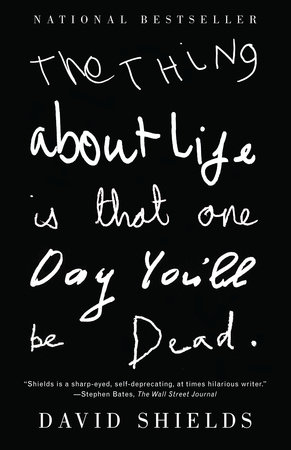The Thing About Life Is That One Day You’ll Be Dead Reader’s Guide
By David Shields


1. The book begins with this sentence: “Let the wrestling match begin: my stories versus his stories.” Do you see this book as a battle between David Shields and his father? If so, what are they arguing about, and who wins in the end?
2. Shields emphasizes the idea that people should face the bare facts of life, including our inevitable decline and death. However, he does not find his own unflinching investigation of the limits of our mortality upsetting. How does his perspective enable him to incorporate but move beyond gloom? How does his father’s perspective differ?
3. The book is a mixture of anecdotes from various stages of David Shields’s life and his father’s life. In addition, the reader is given dozens of quotations, and entire sections that are focused on scientific data about the aging process. What holds all of these different forms of writing together? What did you think of this structure for the book?
4. The book charts the various stages of life. Do any parts of this aging process, as described in the book, frighten you or make you feel other emotions? As you read, how do you relate, personally, to the different stages of life being described? How does this book make you feel about your own aging process?
5. The title of the book, The Thing About Life Is That One Day You’ll Be Dead is, in a sense, flippant or humorous. It’s also a harsh truth. How does humor work in the book? How does harsh truth work in the book?
6. Over the course of the book, the author provides dozens and dozens of quotations from historical figures, and from other writers. What did you notice about this collection of people, all together? Which individual quotations most resonated with you?
7. What is the role of sports in the book? There are eight sections named “Hoop Dream.” How do these sections, specifically, and sports in general, interact with the themes of the book?
8. Another running theme in the book is fame and popular culture. How do Shields’s discussions of fame and popular culture touch on the central themes of the rise and fall of the human body?
9. The book is filled with coexisting dualities: Peter Parker vs. Spiderman, Milt’s tough exterior vs. his emotional vulnerability, the urge humans have for our offspring to be like us vs. the hope that they will be nothing like us. How else do you see this theme surfacing in the book? What do you think the author is getting at with these dualities?
10. How does the author incorporate scientific evidence into this book? How does science function in the work for you, the reader?
11. Of all the biological data in the book, which pieces of information have become most clearly lodged in your mind? Were there pieces of this kind of data that you wanted to share with other people? If so, what were they, and why did you want to share them?
12. How would you quantify this book? Is it nonfiction; is it memoir, biography, literary criticism? How does it affect your experience as reader that it is not easy to categorize? Why do you think that the author wrote it this way?
13. In the chapter “Everything I Know I’ve Learned from My Bad Back,” Shields talks at length about his bad back. What does he mean when he says that “everything” he knows he learned from his bad back? What, in this context, is “everything”?
14. How do you think Milt Shields felt about this book, its publication, and the fact that it became a bestseller? What do you imagine he said to his son about it?
15. The book ends with notes for five different eulogies Shields might give at his father’s funeral. Why five eulogies and not one? How do the eulogies differ from one another?